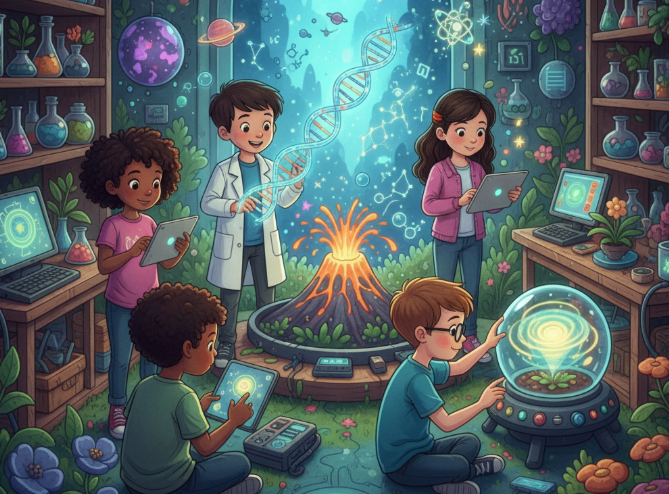Introduction: Learning Through Play
Kids are naturally curious. They love to explore, test, and figure things out on their own. That’s why science games are such powerful learning tools—they transform curiosity into knowledge. Instead of memorizing boring facts, children get to play, experiment, and discover, all while sharpening their problem-solving skills.
Today, parents and teachers have access to hundreds of science-based games designed to boost memory, critical thinking, and creativity. From board games that teach chemistry to digital apps that explain the solar system, these activities make learning fun and meaningful.
In this guide, we’ll explore the best science games that make kids smarter—not just in the classroom, but in everyday life.
Why Science Games Matter
Before we dive into specific games, let’s highlight why these games are more than just “fun time.”
Benefits of Science Games for Kids:
-
Encourage critical thinking and logical reasoning
-
Improve memory and focus
-
Build problem-solving skills
-
Spark creativity and imagination
-
Develop teamwork and communication (when played in groups)
-
Make complex science topics easy to understand
-
Boost confidence by allowing kids to test ideas safely
Quick Comparison: Traditional Learning vs. Science Games
| Aspect | Traditional Learning (Textbooks) | Science Games (Interactive) |
|---|---|---|
| Engagement | Low, kids lose interest quickly | High, keeps them excited |
| Retention of Knowledge | Short-term | Long-term through play |
| Creativity | Limited | Encouraged |
| Teamwork | Rarely included | Often required |
| Real-Life Application | Abstract | Hands-on, practical |
Clearly, science games turn learning into an adventure instead of a chore.
Categories of Science Games That Boost Intelligence
Science games come in many forms. Here are the main categories:
-
Board Games – Hands-on and perfect for family play nights
-
Card Games – Quick, portable, and easy to play anywhere
-
Digital Games & Apps – Interactive learning on tablets or computers
-
DIY Experiments as Games – Science activities turned into challenges
-
Outdoor Science Games – Encourage kids to connect science with nature
We’ll explore top picks from each category below.
Best Science Board Games for Smarter Kids
1. Gravity Maze (ThinkFun)
-
Teaches: Physics, engineering, problem-solving
-
Players must build a marble maze with towers so the ball reaches its target.
-
Encourages logical sequencing and spatial reasoning.
Why it’s smart: Kids practice trial and error, just like real scientists.
2. Cytosis: A Cell Biology Game
-
Teaches: Biology, cell structures, molecular processes
-
Players build enzymes, hormones, and receptors inside a human cell.
-
Perfect for middle and high school students.
Why it’s smart: Makes cell biology interactive instead of overwhelming.
3. Planet (Blue Orange Games)
-
Teaches: Earth science, ecosystems
-
Players build 3D planets using magnetic tiles of deserts, forests, and oceans.
-
The challenge is to attract the right animals to thrive.
Why it’s smart: Encourages understanding of how ecosystems depend on balance.
4. Dr. Eureka
-
Teaches: Chemistry basics, logical thinking, speed
-
Kids act like scientists transferring colored balls between test tubes.
-
Fast-paced, fun, and teaches precision.
Best Science Card Games for Brain Development
1. Ion: A Compound Building Game
-
Teaches: Chemistry bonding and ions
-
Kids combine cards to create stable compounds like water or salt.
2. Peptide: A Protein Building Game
-
Teaches: DNA, RNA, and protein synthesis
-
A step up for older students learning about genetics.
3. Science Ninjas: Valence
-
Teaches: Chemistry and elements
-
Players combine atoms to form molecules while battling like ninjas.
Digital Science Games and Apps Kids Will Love
1. Kerbal Space Program
-
Teaches: Physics, space exploration, engineering
-
Kids build rockets and space programs while learning gravity and fuel dynamics.
2. Toca Lab: Elements
-
Teaches: Chemistry and periodic table
-
Colorful, interactive app where kids experiment with elements.
3. BrainPOP Science Games
-
Teaches: Multiple subjects including biology, physics, and earth science
-
Combines videos with interactive quizzes and games.
4. Minecraft Education Edition
-
Teaches: Physics, engineering, ecosystems
-
Kids build worlds while exploring chemistry labs, circuits, and biodiversity.
DIY Science Experiments Turned Into Games
Parents can also turn everyday science experiments into games.
1. Balloon Rocket Challenge
-
Teaches: Newton’s Third Law of Motion
-
Kids race balloons tied to strings and measure which one goes faster.
2. Invisible Ink Spy Game
-
Teaches: Chemistry (acid-base reactions)
-
Use lemon juice to write secret messages, then reveal with heat.
3. Egg Drop Contest
-
Teaches: Engineering, physics
-
Kids design a protective structure so an egg won’t break when dropped.
Outdoor Science Games
1. Nature Scavenger Hunt
-
Teaches: Biology, ecology
-
Create a checklist (insects, leaves, rocks) and let kids explore.
2. Shadow Chase Game
-
Teaches: Earth science (rotation, shadows)
-
Kids measure shadows at different times to see how they change.
3. Water Filtration Race
-
Teaches: Environmental science
-
Kids design mini filters with sand, gravel, and cotton, then test water clarity.

Science Games That Make Kids Smarter
How Science Games Improve Intelligence
Science games aren’t just entertainment. Research shows they improve multiple areas of intelligence.
Cognitive Benefits of Science Games:
-
Memory – Remembering patterns, sequences, and facts
-
Logic – Solving puzzles and predicting outcomes
-
Creativity – Designing solutions and testing new ideas
-
Focus – Staying engaged with a task for longer periods
-
Collaboration – Working in teams, sharing ideas
Choosing the Right Science Game for Your Child
When selecting a science game, consider:
-
Age Suitability – Is it designed for their grade level?
-
Interest Area – Does your child prefer space, chemistry, or biology?
-
Learning Goals – Do you want to boost problem-solving, teamwork, or memory?
-
Game Type – Board, card, app, or outdoor activity?
-
Replay Value – Will kids enjoy playing it more than once?
Sample Weekly Science Game Plan
Here’s a simple weekly rotation plan parents can use:
| Day | Activity/Game | Focus Area |
|---|---|---|
| Monday | Gravity Maze (board game) | Logic & engineering |
| Tuesday | Ion (card game) | Chemistry basics |
| Wednesday | Minecraft Education | Creativity & design |
| Thursday | Balloon Rocket Challenge (DIY) | Physics |
| Friday | Nature Scavenger Hunt (outdoor) | Biology & ecology |
| Saturday | Kerbal Space Program (digital) | Space exploration |
| Sunday | Family Science Trivia Night | General knowledge |
This schedule keeps learning diverse and exciting.
Tips for Parents to Make Science Games More Effective
-
Play together – Show interest in your child’s progress
-
Ask questions – Encourage them to explain “why” something worked
-
Limit screen time – Balance digital games with board and outdoor ones
-
Reward curiosity – Celebrate small discoveries
-
Encourage creativity – Let kids invent their own science challenges
Conclusion: Smarter Kids Through Science Play
Science doesn’t have to be intimidating. When wrapped in the form of fun, interactive games, it becomes exciting, memorable, and confidence-boosting. Whether it’s building molecules with cards, exploring the solar system in a digital game, or racing balloon rockets across the living room, science games give kids the skills they’ll use for a lifetime.
So, the next time you wonder how to make learning enjoyable, try swapping worksheets for science games. You’ll not only see better grades—but also happier, smarter, and more curious kids.




